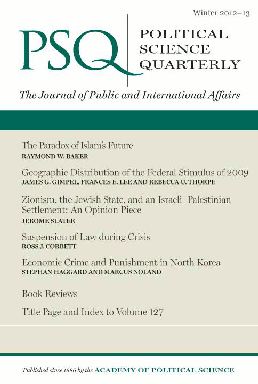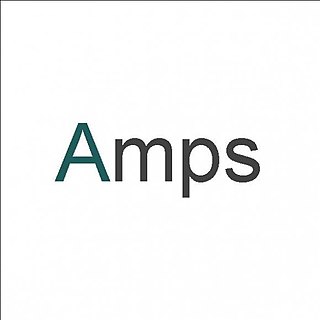
Academic publishing is the subfield of publishing which distributes academic research and scholarship. Most academic work is published in academic journal articles, books or theses. The part of academic written output that is not formally published but merely printed up or posted on the Internet is often called "grey literature". Most scientific and scholarly journals, and many academic and scholarly books, though not all, are based on some form of peer review or editorial refereeing to qualify texts for publication. Peer review quality and selectivity standards vary greatly from journal to journal, publisher to publisher, and field to field.

Open access (OA) is a set of principles and a range of practices through which research outputs are distributed online, free of access charges or other barriers. Under some models of open access publishing, barriers to copying or reuse are also reduced or removed by applying an open license for copyright.

Political Science Quarterly is an American double blind peer-reviewed academic journal covering government, politics, and policy, published since 1886 by the Academy of Political Science. Its editor-in-chief is Robert Y. Shapiro. Each issue consists of five or six articles as well as up to 40 book reviews.
Social peer-to-peer processes are interactions with a peer-to-peer dynamic. These peers can be humans or computers. Peer-to-peer (P2P) is a term that originated from the popular concept of the P2P distributed computer application architecture which partitions tasks or workloads between peers. This application structure was popularized by file sharing systems like Napster, the first of its kind in the late 1990s.

The Directory of Open Access Journals (DOAJ) is a website that hosts a community-curated list of open access journals, maintained by Infrastructure Services for Open Access (IS4OA). It was launched in 2003 with 300 open access journals. The project defines open access journals as scientific and scholarly journals making all their content available for free, without delay or user-registration requirement, and meeting high quality standards, notably by exercising peer review or editorial quality control. DOAJ defines those as open access journals where an open license is used so that any user is allowed immediate free access to the works published in the journal and is permitted to read, download, copy, distribute, print, search, or link to the full texts of [the] articles, or use them for any other lawful purpose. The mission of DOAJ is to "increase the visibility, accessibility, reputation, usage and impact of quality, peer-reviewed, open access scholarly research journals globally, regardless of discipline, geography or language."
The commons is the cultural and natural resources accessible to all members of a society, including natural materials such as air, water, and a habitable Earth. These resources are held in common even when owned privately or publicly. Commons can also be understood as natural resources that groups of people manage for individual and collective benefit. Characteristically, this involves a variety of informal norms and values employed for a governance mechanism. Commons can also be defined as a social practice of governing a resource not by state or market but by a community of users that self-governs the resource through institutions that it creates.

The Journal of Artificial Intelligence Research (JAIR) is an open access peer-reviewed scientific journal covering research in all areas of artificial intelligence.
PubMed Central (PMC) is a free digital repository that archives open access full-text scholarly articles that have been published in biomedical and life sciences journals. As one of the major research databases developed by the National Center for Biotechnology Information (NCBI), PubMed Central is more than a document repository. Submissions to PMC are indexed and formatted for enhanced metadata, medical ontology, and unique identifiers which enrich the XML structured data for each article. Content within PMC can be linked to other NCBI databases and accessed via Entrez search and retrieval systems, further enhancing the public's ability to discover, read and build upon its biomedical knowledge.

Emerging Infectious Diseases (EID) is an open-access, peer-reviewed journal published by the Centers for Disease Control and Prevention (CDC). EID is a public domain journal and covers global instances of new and reemerging infectious diseases, putting greater emphasis on disease emergence, prevention, control, and elimination. According to Journal Citation Reports, the journal's 2022 impact factor is 11.8. The journal also has a 2023 Google Scholar h5-index score of 106, ranking it 2nd in the epidemiology category and 4th in the communicable diseases category.

The sustainable city, eco-city, or green city is a city designed with consideration for social, economic, environmental impact, and resilient habitat for existing populations, without compromising the ability of future generations to experience the same. The UN Sustainable Development Goal 11 defines sustainable cities as those that are dedicated to achieving green sustainability, social sustainability and economic sustainability. They are committed to doing so by enabling opportunities for all through a design focused on inclusivity as well as maintaining a sustainable economic growth. The focus also includes minimizing required inputs of energy, water, and food, and drastically reducing waste, output of heat, air pollution – CO2, methane, and water pollution. Richard Register, a visual artist, first coined the term ecocity in his 1987 book Ecocity Berkeley: Building Cities for a Healthy Future, where he offers innovative city planning solutions that would work anywhere. Other leading figures who envisioned sustainable cities are architect Paul F Downton, who later founded the company Ecopolis Pty Ltd, as well as authors Timothy Beatley and Steffen Lehmann, who have written extensively on the subject. The field of industrial ecology is sometimes used in planning these cities.
Scholarly communication involves the creation, publication, dissemination and discovery of academic research, primarily in peer-reviewed journals and books. It is “the system through which research and other scholarly writings are created, evaluated for quality, disseminated to the scholarly community, and preserved for future use." This primarily involves the publication of peer-reviewed academic journals, books and conference papers.
Geoforum is a peer-reviewed academic journal of geography which focuses on social, political, economic, and environmental activities that occur around the globe within the context of geographical space and time.

Cell Reports is a peer-reviewed scientific journal publishing research papers across a broad range of disciplines within the life sciences. The journal was established in 2012 and is the first open access journal published by Cell Press, an imprint of Elsevier.

Circles of Sustainability is a method for understanding and assessing sustainability, and for project management directed towards socially sustainable outcomes. It is intended to handle 'seemingly intractable problems' such as outlined in sustainable development debates. The method is mostly used for cities and urban settlements.

Architecture Media Politics Society (AMPS) is a nonprofit academic research organisation. Its associated peer reviewed open access online journal is Architecture_MPS ISSN 2050-9006. It was set up in 2011 and the journal officially launched in 2012. Since 2015 it has been published by UCL Press. It is dedicated primarily to the study of architecture but examines it in the context of what it refers to as the mediated environment of contemporary culture.

Comunicar is a quarterly peer-reviewed open access academic journal covering research on education, communication, and social sciences. Articles are published in Spanish and English and have abstracts in Chinese and Portuguese. The journal was established in 1993 and is published by Grupo Comunicar. Since 2016 it is published quarterly. Its editor-in-chief is Ignacio Aguaded. The journal is abstracted and indexed in the Social Sciences Citation Index and Scopus. According to the Journal Citation Reports, the journal has a 2016 impact factor of 2.212.
The Hague Journal of Diplomacy (HJD) is a peer-reviewed academic journal published quarterly. HJD publishes research on the theory, practice, processes and outcomes of diplomacy in both its traditional state-based forms, as well as contemporary diplomatic expressions practiced by states and non-state entities. Prof. Jan Melissen is the Editor-in-Chief of the Hague Journal of Diplomacy. Prof. Jan Melissen (Leiden University and University of Antwerp) and Prof. Paul Sharp (University of Minnesota, Duluth) are the journal's founding co-editors. Dr. Constance Duncombe (Monash University), Dr. Jérémie Cornut (Simon Fraser University, Vancouver), Dr. Marcus Holmes (The College of William & Mary), Dr. Halvard Leira (Norwegian Institute of International Affairs) and Dr. Deepak Nair (Australian National University) are Associate editors of HJD. Founded in 2005, HJD published its inaugural issue in January 2006. The journal is published by Brill/Nijhoff
The Journal of Social Ontology is a peer-reviewed interdisciplinary academic journal with a focus on social ontology and collective intentionality. It is supported by International Social Ontology Society. The journal's editor-in-chief is Hans Bernhard Schmid.

Akropolis: Journal of Hellenic Studies is an annual open access peer-reviewed academic journal devoted to the study of Hellenic culture and civilization from antiquity to the present. It was established in 2017 and is published by the Center for Hellenic Studies, based in Podgorica.
Critical Review of International Social and Political Philosophy (CRISPP) is a peer-reviewed academic journal which 'explores the normative assumptions and implications of current public policy issues and socio-political-legal processes.' The journal is indexed and abstracted in Political Science Abstracts, International Political Science Abstracts, Sociological Abstracts, Social Planning/Policy and Development Abstracts, CSA Political Science and Government and the Philosophers Index. Also included in Clarivate's Emerging Sources Citation Index, Political Science.











